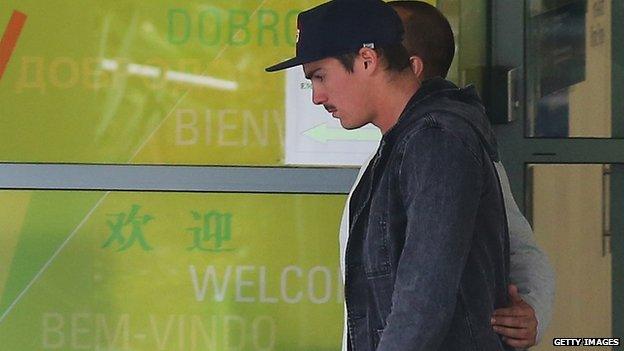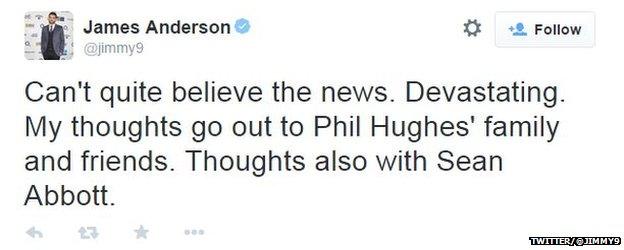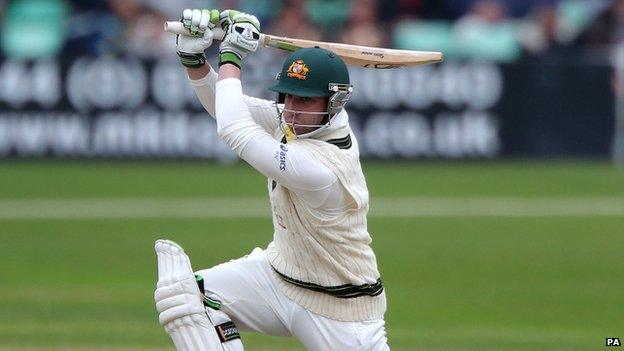'Please keep Sean Abbott in your thoughts'
- Published

Bowler Sean Abbott leaves St Vincent's Hospital following the death of Phillip Hughes
Australia Test batsman Phillip Hughes has died, two days after being struck by a ball during a match in Sydney.
Hughes, 25, passed away in hospital, never regaining consciousness.
While tributes have been paid to Hughes, support has also been shown for Sean Abbott - the man who bowled the fatal ball.
Cricket Australia tweeted that it was an "incredibly sad day" but urged people to "please keep Sean Abbott in your thoughts."

England bowler Jimmy Anderson on Twitter

Hughes was wearing a helmet but the ball struck him on the top of the neck
Hughes, batting for South Australia, collapsed face first on the ground after being hit by a bouncer from 22-year-old Abbott during a Sheffield Shield game against New South Wales on Tuesday 25 November.
Hughes, who also played for Hampshire, Middlesex and Worcestershire, was wearing a helmet but the ball struck him at the top of the neck, causing the injury.
'Not going to be easy'
BBC Sport cricket analyst Simon Hughes said Sean Abbott will need "a lot of support" to come to terms with the incident, which has been described as a freak accident.
Dr Victor Thompson is a sports psychologist who told Newsbeat it may be some time before Sean Abbott will be ready to play again.
"There is a way back in but it's not going to be an easy road," he said.
"The biggest thing he has to absorb [before this] is bad performance. Now he has to absorb the fact that he was involved in somebody dying.
"He will be trying to work out was it his fault? Is he to blame? And all of that, because the emotions are so high, gets associated with playing cricket.
"So when he thinks about going out there again, when he thinks about putting his pads on, or putting his kit on and being around teammates or the smell of the cricket bat - it'll all be associated to that very traumatic day."

Four steps to Sean Abbott's potential recovery - Dr Victor Thompson

1. "Get support from friends family and other professionals to help him feel like he can discuss what's gone on."
2. Rationalise the reaction.
"Even though you feel it might be really likely to happen again, the probability is actually much lower than you feel it's likely to be."
3. "Gain experience going out there and playing with your team mates, bowling again."
4. Allow time to pass.
"Believe that things will subside. It will probably be a number of months before he's going out there and he's not dominated by the experience."

Dr Thompson added that full out avoidance of what has happened wouldn't help Abbott's mental recovery.
"It's a bit like falling off your horse and trying to pretend that you didn't hurt yourself or that experience didn't happen," he said.
"Your brain knows it happened and denying it happened really doesn't work for anyone."
The 'what if' phase

If blocking out the experience isn't an option for Abbott where's best for him to turn to next?
Dave Damon, a volunteer helpline advisor for charity Cruse Bereavement Care, told Newsbeat that because his relation to the death is so unique that "it might be difficult for him to find people to relate to".
He added: "There's a complication about a misplaced guilt or a kind of [mental] bargaining sense of 'what if I had done something differently?'.
"It's difficult to second guess exactly what he's going through. However, you have heard of long period of [mental] bargaining... and replaying the incident in his head."
"It's about being aware of the support you may or may not need... to talk through any of these emotions, that are potentially being bottled up out in the open."
Dave explained Abbot's grief may take different forms and even if it seems to subside quickly, it may re-emerge in "unexpected ways" and at unexpected times.
He said in the short-term: "Finding someone who can understand him and listen to him with empathy - that might be very important."
Follow @BBCNewsbeat, external on Twitter and Radio1Newsbeat, external on YouTube